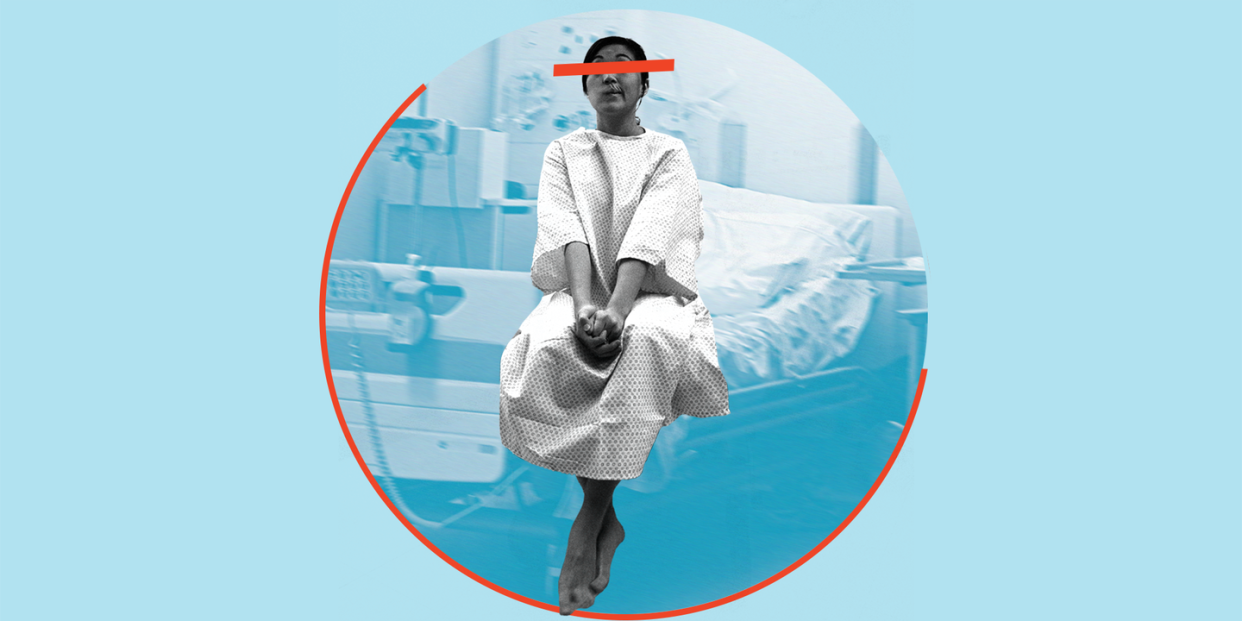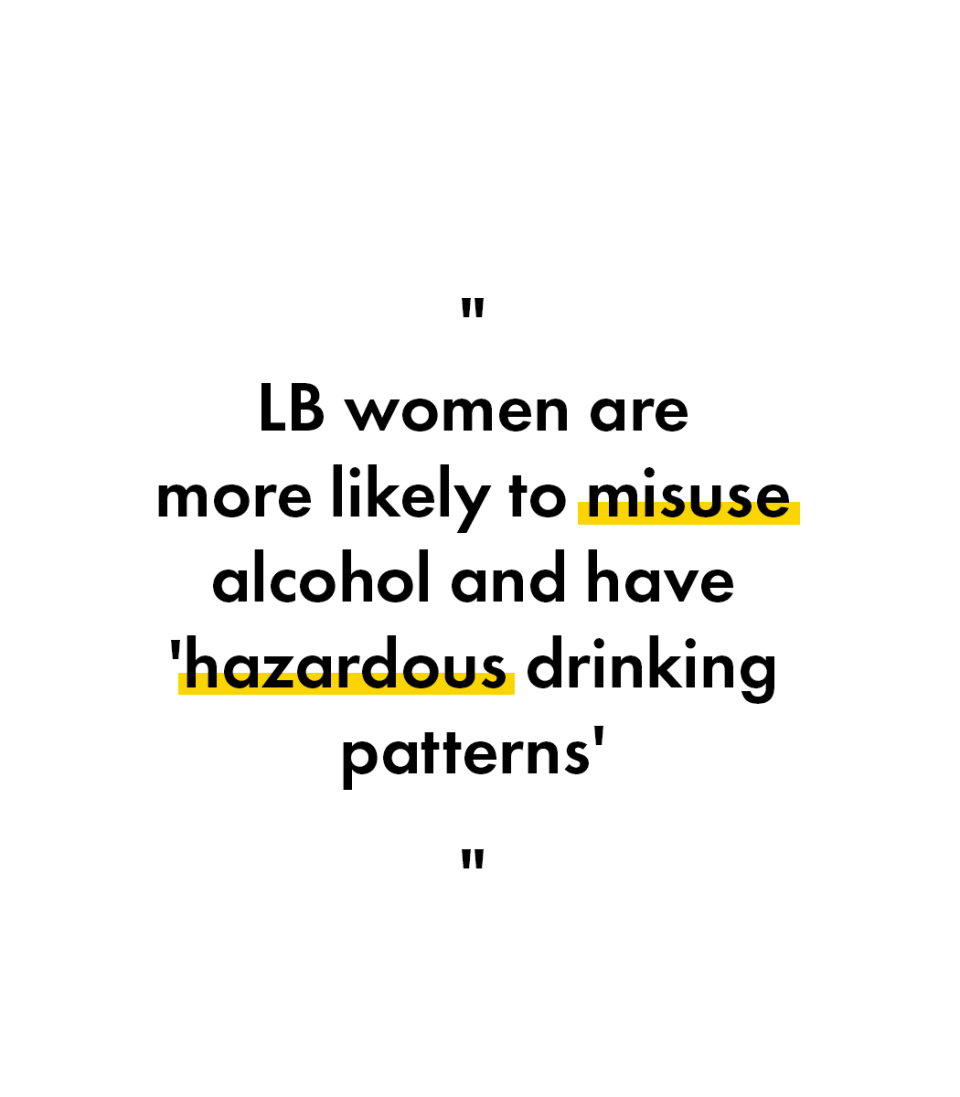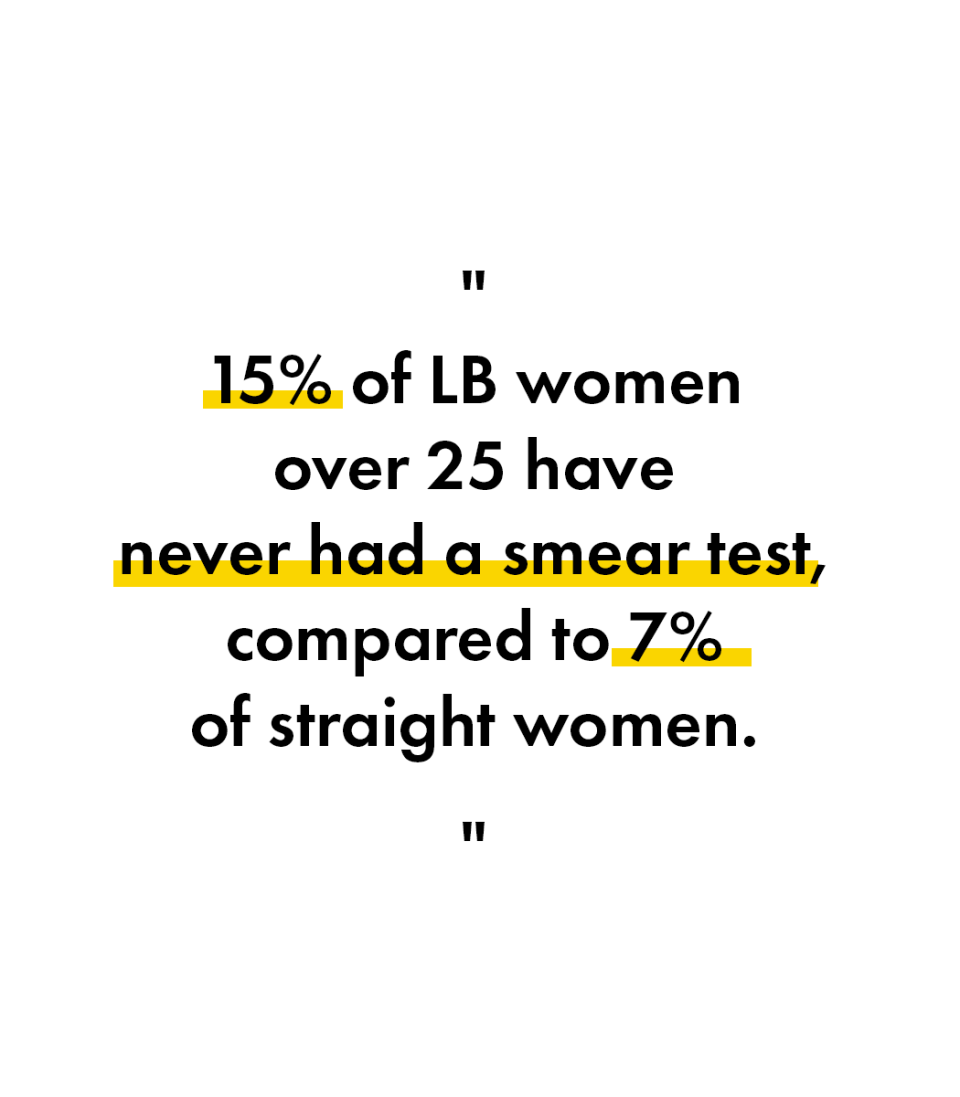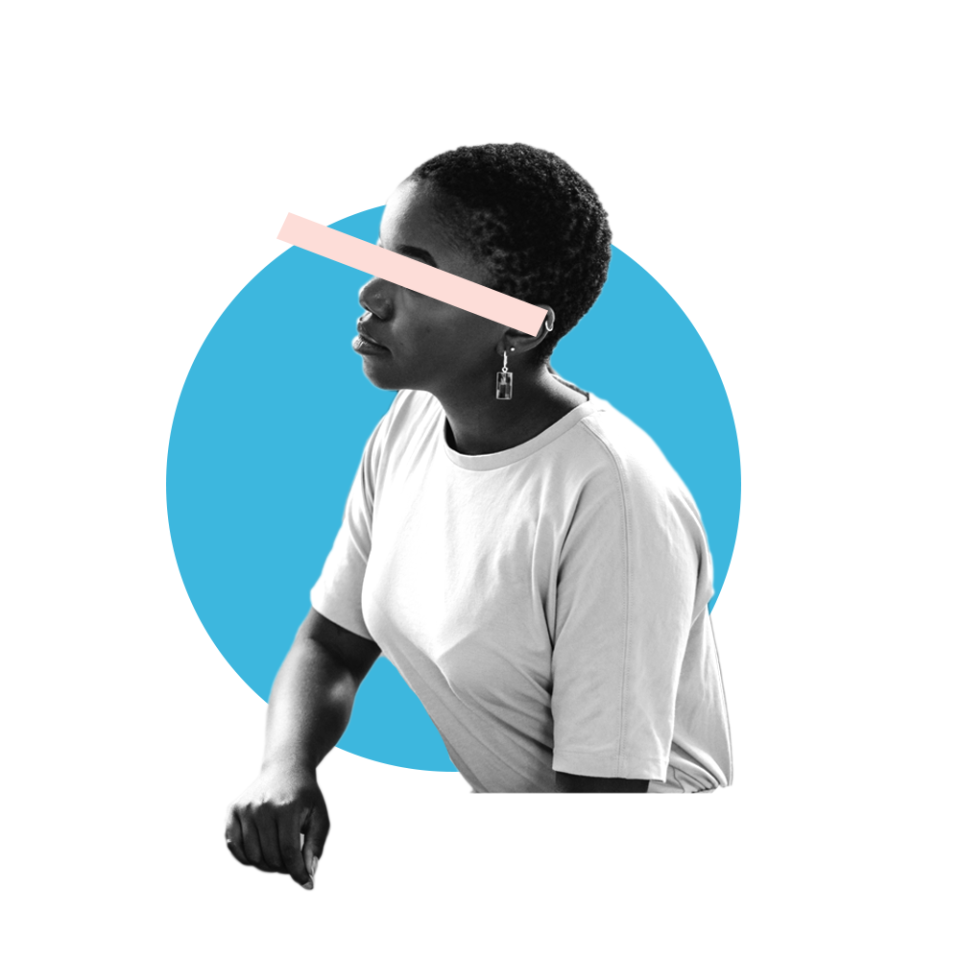Are queer women being failed by our healthcare system?

As the nurse conducting her smear test went through the routine questions, Lily* nervously awaited The Big One. But the question never came. Lying on the bed, legs spread, Lily cleared her throat and took a deep breath.
“I’m a lesbian, by the way. I thought you might need to know.”
Taken aback, the nurse swiftly put down the speculum that was in her hand. “Oh,” she laughed. “I’ll use the smaller one then… and lots of lube.”
This might seem like a harmless, slightly inappropriate remark. But when Lily left that clinic she knew one thing: she didn’t want to go for a smear test ever again. The assumptions made about her sex life made her feel uncomfortable and embarrassed. Lily’s experience isn’t unique. It’s indicative of the serious health inequalities lesbian, bisexual and trans women, and non-binary people face.

For writer Juno Roche, going to the doctors as a trans and HIV positive woman can be an ordeal. “When I walk into a GPs room or surgery, I go in as someone that they don't often come across. Instantly there’s a nervous rapport. A year and a half ago I saw a doctor for a yeast infection. They said, ‘Oh I don’t know what to give you. I don't know what your anatomy is like.’ So it had to be this embarrassing thing of me saying, ‘This is what I’ve got’.”
The gender health gap in the UK - where women are inadvertently discriminated against in healthcare - is slowly coming to light. But for women and non-binary people who are also LBT, that gap is even wider. Consistent evidence shows that LBT women have worse general health than straight women. As well as experiencing prejudice from healthcare professionals, a higher proportion of LBT women than straight women have been diagnosed with a rare cancer. They’re more likely to be depressed and anxious, fall pregnant as teenagers, have asthma and battle with alcohol and drug misuse. And the most worrying thing is, most don’t even know these health inequalities exist. We’re exploring how the healthcare system is failing them - and what needs to be done about it.
Coming out to a stranger
Despite what pop culture would have you believe, coming out isn’t a one-time event. Queer people have to do it every day, often to total strangers. In healthcare settings heterosexuality is regularly assumed, with staff asking questions about boyfriends rather than asking someone who they have sex with. This then puts the onus on the patient to correct their doctor, and ‘out’ themselves.
“Everything is so heteronormative at the GP and hospital and it makes me uncomfortable,’ says Aisha*, a 32-year-old pansexual. “When our answers don't fit their questions because they haven't been open-ended enough, that's when we are forced to 'come out' again and again.”
“I’ve never been asked my sexuality and constantly have to ‘come out' to medical professionals, even when my wife is sitting with me,” Rai, a 34-year-old gender fluid lesbian, agrees. “I'm out and proud. But it still makes me feel awkward when doctors presume I'm sexually active with men because I then have to explain that’s not the case.”

For trans people, assumptions about their gender identity and ignorant remarks can be much more harmful. The Government Equalities Office’s National LGBT Survey in 2018 found 15.4% of trans women have been subjected to inappropriate curiosity when accessing healthcare, something that can stop them wanting to go back to the doctor.
And while there’s a lack of specific research into BAME or disabled LBT women’s experiences, it’s known that queer people of colour - especially black trans women - experience unparalleled levels of discrimination.
The LBT mental health crisis
When Bruna*, a 21-year-old non-binary bisexual, went to A&E during a mental health crisis, they were in desperate need of help. But the treatment they faced made their situation so much worse. “I explained being misgendered and victimised at work is hugely impacting my mental health. I also told the nurse my pronouns are they/them," they say. "After being sent away but given a follow up appointment, I had a meeting with a mental health crisis team and they consistently misgendered me. It’s made me so reluctant to speak to anyone again."
We know that we are currently in the midst of a mental health crisis, that the NHS is under strain and that some people are waiting more than 90 days for regular treatment (before you even take into consideration the extra delays due to the pandemic), but for the LGBTQ community the situation is even more dire. A Stonewall report from 2018 found seven in 10 non-binary people and two thirds of trans people had experienced depression in the past year. Research for medical journal BMC Psychiatry shows bisexual women are more than twice as likely as straight women to be anxious or depressed.

LBT women and non-binary people are also more likely to self-harm and have suicidal thoughts. One in four young trans people have attempted suicide, and 89% have thought about it. In the last year, 5% of lesbians had attempted suicide. This increases to 7% of bisexual women, 7% of BAME and 10% of disabled LB women.
While meeting the much-needed demand for mental health services will take time (and a hefty dose of cash) progress is on its way: NHS England last year announced a range of new initiatives– although none of these specifically address LBT women. There is also one thing that can be done to help LBT women now – and it’s so simple: learn how speak to them in a respectful way. Currently, due to a lack of specific training, this doesn’t always happen.

When Ness*, a 30-year-old non-binary bisexual, went for a mental health assessment last year, staff members made jokes about trans people. “In the assessment I stated that I have a lot of trans friends who support me. The therapists then tried to have a ‘jokingly’ light-hearted conversation about what being opposite sex would be like,” she says. “They even put on voices.”
The National LGBT Survey found 18% of trans people avoided treatment exactly for this reason, and for fear of discrimination or intolerant reactions. And often, when trans people do see a doctor, they’re turned away. “If you have had surgery and go to a GP for anything to do with your genitals, they can’t refer you back to a urologist because they won’t know what to do,” Juno says. “In relation to hormones it’s a f*cking nightmare - no one has a clue what your hormone intake should be. It took me a year to find an endocrinologist who could identify my levels. I cut my own hormones down. Every single GP I spoke to said they didn't know what to do, as they are used to speaking to natal women going through the menopause. It’s not their fault, but that’s their only frame of reference.”
All of which could contribute to the community self-medicating with illegal drugs and alcohol. The stress, biphobia, homophobia and discrimination LB women face because of their sexual orientation are all thought to be the reason why they’re more likely to misuse alcohol and have “hazardous drinking patterns”. Recreational drug use is also highest among lesbians, and closely followed by bisexual women.
LBT health myths
Growing up as an LBT woman you’re told, frequently, that certain parts of sex education don’t apply to you. Teen pregnancy is something that happens to your straight friends. That HPV is caught through penis-in-vagina sex so you won’t need the vaccine. This then carries on to when you’re older and it’s time for your smear – you won’t go, not only because you don’t want to have to come out to yet another healthcare professional but also because – what’s the point – you’re not at risk. These commonly held misconceptions simply aren’t true.

A 2018 Public Health England report detailed a prevalence of certain rarer cancers is higher in LB women compared to straight women. LB women were found to be overrepresented in patients diagnosed with tonsil cancer, which researchers suggested could be linked to oral sex. It’s a misconception that LB women aren’t at risk of HPV as it’s mainly passed on through penetrative sex with a penis. But HPV can be spread through vaginal oral sex as well – highlighting the need for HPV vaccinations in women of all sexual orientations.
Because these facts aren’t widely known, this demographic is the least likely to attend cancer screenings, especially gendered tests for breast and cervical cancers. De Montfort University researchers found LB women are 10 times less likely to have had a cervical screening in the past three years than straight women. 15% of LB women over 25 have never had one, compared to 7% of straight women. With 37% of LB women in the North West having been told they do not require a cervical screening because of their sexual orientation, misinformation surrounding LB women’s health is real concern.
Miseducation around sexual health also means less than half of LB women have ever had an STI test - despite population surveys finding LB women have higher rates of some sexually transmitted infections like bacterial vaginosis. As for teenage pregnancy? It’s actually higher for LB women than for straight women, with adult bisexual women specifically being twice as likely as straight adolescents to become pregnant.
Dr Kate Yarrow, a sexual and reproductive health consultant for the Faculty of Sexual and Reproductive Healthcare puts this partly down to a lack of inclusive sex education. “We know young people from minority groups are vulnerable. If you have a young person who is uncertain about their sexuality and going through a process of experimentation, they might not be aware of the fact they need to protect themselves,” she says.
Why does the LBT health gap exist?
When Daisy*, a 34-year-old lesbian, arrives on the hospital ward she works as a nurse, she wears a bright rainbow badge, proudly emblazoned with NHS on her lapel. It’s an NHS initiative - which sees healthcare staff show their support for LGBTQ+ patients by wearing an NHS Pride badge. Now several of her colleagues do the same.
“I am the only LBT person in my team,” she says. “At first I kept my sexuality quiet, but then I was outed around three months in by a colleague, which at the time I was really embarrassed about.” Daisy then volunteered to be the equality and diversity lead for her area and now offers trans awareness training for her colleagues.

The LGB&T Partnership that runs LBT Women’s Health Week every year says the lack of mandatory LGBTQ+ training for healthcare professionals needs to change. Challenging homophobic and transphobic language at work shouldn’t have to fall to the shoulders of people like Daisy – and even still there are very few LBT women and non-binary people working in leadership and decision-making positions within healthcare. This impacts the services greatly. With so few LBT women at, or even close to, the top of the ladder, the healthcare needs of LBT women are not being catered to at service level.

Without knowledge of the issues facing the community, straight and cisgender healthcare professionals can feel they don’t have the knowledge to speak openly with their queer patients. Charlotte, 24, a pansexual psychological wellbeing practitioner says her team has no LGBTQ+ awareness training, only general diversity training. “We don’t ask preferred pronouns and names regularly, and therefore [patients] often don’t feel comfortable speaking up.”
“Most nurses would never dream of hurting anyone directly or indirectly,” Daisy says – discussing the negative remarks she has challenged in her workplace. “Those colleagues now think a little differently. Having these conversations with someone like me helps to shift their world view. I hope continued education and visibility will prevent careless words and actions.”
Ali Strick, a 30-year-old disabled bisexual woman, works in private and public mental health services and says her organisation doesn’t monitor sexual orientation or trans status “unless a client mentions there are changes to their gender identity or sexuality”. She recognises having this information vastly improves the quality of healthcare a patient receives. “I know there are highly sensitive subjects relating to the structure of a person's identity, and if that’s not approached in a really careful way early on it can be really damaging to them,” she says. It’s why she founded the grassroots organisation Arts Sisterhood, which uses DIY art therapy to tackle the causes of mental health issues for disabled and queer women and people of colour.
❤️🌈 Happy Pride to everyone in London!
A post shared by Arts Sisterhood UK (@arts.sisterhood.uk) on Jul 6, 2019 at 10:04am PDT
Closing the gap
Data collection is vital for closing the LBT health gap – it can help the services monitor how present LBT women are, how they are using them and what changes need to be made as a result. In 2017 the NHS Information Standard on Sexual Orientation Monitoring will begin to standardise the collection of demographic data alongside ethnicity, disability and gender. This should over time mean we have a much better understanding of the health inequalities LBT women face.
For Bruna, finding a lovely NHS therapist who respected and listened to them made them comfortable enough to continue getting help. “I vaguely mentioned my pronouns,” they say. “Her simply asking for clarification on how to use them, and saying that she’d use them in any correspondence going forward made all the difference. It made me feel that I could be my complete, full self with her - which obviously in the context of therapy is incredibly important.”
*Names have been changed

You Might Also Like

